Auberon Waugh on Mary McCarthy
Birds of America Mary McCarthy (Weidenfeld and Nicolson £1.75) I do not know if there is a name in psychiatric medicine for the illness which afflicts nearly all mothers when their children first learn to talk. Its symptoms are most distressing, especially if one has any fondness for the mother. Quite suddenly, these beautiful, intelligent and amusing creatures become obsessed by the idea that the world wishes to hear whatever bons mots have issued from their beloved infants' mouths. First words are never witty or profound, and seldom very original or even bizarre; nor are they improved by being recorded in a specially twee voice. Womanhood loses all its dignity, charm and sense of decorum when in the grips of this distressing illness, which might be characterized as material infantilism. However, after a brief and nostalgic visit to my Greek-English Lexicon by Messrs Liddell and Scott, I am in a position to coin a more impressive name for it : brephornimesis.
However distressing the symptoms of this disease, they seldom last more than a few years — until the child is four, or five at most, when healthy mothers revert to their habitual concerns. Another point which can be made in its favour is that brephomimetics seldom feel the urge to write novels while the frenzy is upon
them. A novel by Margaret Drabble, for Instance, written in baby-talk, might make an amusing subject for a Spectator Competion, but it would be the very devil for the poor reviewer who had to read it. This abstention from novel-writing is a characteristic which brephomimesis shares With most diseases of the central nervous system — rabies, palsy, St Vitus's Dance etc — but with few illnesses of the mind, alas. Its incidence is so regular among mothers of young children that one might almost suppose it is part of a healthy woman's normal development, one of the six ages of woman. When the illness lasts beyond a child's seventeenth birthday, and when the unfortunate victim starts writing novels under its influence, the time has come to call a halt. I do not know or care, really, Whether Miss McCarthy has now or has ever had a child of the age she describes in her latest novel. I hope not, of course, from the poor lad's point of view, but common charity has no place in a book review. Whether her brephomimesis is psychic or somatic, whether hysterical or physical, the results are appalling so far as her novel is Concerned. If there were a union of novel reviewers we should form up on Sir George Weidenfeld and threaten him, under pain of tweaking his nose and pinching his bottom, never again to send us a woman novelist in this distressing condition.
The literary form which Miss McCarthy deploys for her purpose is that of the first novel written by a male adolescent between leaving his public school and going up to university. Nearly every literate Englishman seems to have a crack at novel Writing in this period, although, mercifully, few such novels are ever finished. They have in common that they are all rambling, autobiographical (or more particularly self-obsessed), without any plot, shape or form or desire to entertain. A few are still published by optimists who see promise for a better second novel buried somewhere in the pompous, egocentric drivel. These books may be recognized by one of two codes which publishers display on the dust-jacket : they are either described as being "beneath the gaiety a profoundly serious novel of a young man's search for himself " or compared to Candide.
Miss McCarthy's book is described as a
Candide for the 'seventies." Her hero is !I Very nice, progressive-leaning, anti-pollution young East Coaster who has a particularly close relationship with his mother, a very nice progressive-leaning etc middleaged harpsichord player. The lad is sent to Paris to complete his education there, aLod we read of his adventures just as they naPPened. On page 35 there is a list 0. f. all the foods he liked eating; you know, Kind of homey, so we get into the right Mood for this amazing young son of hers called Peter Levi (if I were the distinguished Jesuit poet of that name I would sae). His relationship with his mother was SO perfect that "that year, he did not Masturbate." , On arrival at Le Havre, it takes him tWenty-seven pages to get his luggage and trno.tor-bike through immigration, into a rain, out of the train and through the Customs. Nothing amusing or unusual hapPens to him in this time, but he has a very boring conversation with the people
in his compartment — the first of many such boring conversations which he has with all the second-rate Americans he meets, about aesthetics, the Vietnam war, the problem of poverty, capitalism versus socialism, the threat to the environment etc. Every opinion expressed is banal, nor do any of them have anything to do with the story, if it can be said there is a story.
Once in Paris, our hero sits down to write a twenty five page letter to his mother. Five pages of this are taken up by describing his bowel movements and how he finds himself psychologically threatened with constipation by the dirt of foreign lavatories. It includes this immortal passage :
How did you ever stand it, Mother, washing my diapers? I remember (or did you tell me?) that when I had done Number Two, you always washed them out yourself before sending them to the diaper service. I wonder if everyone else did. And, if I recall, it was years before I was housebroken.
Perhaps a few people will find this rather twee. Remember, it is chosen from 318 pages for its especial interest. For the rest,



































 Previous page
Previous page